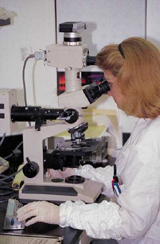 |
 |
Multiple Sclerosis |
In autoimmune diseases, the immune system inappropriately recognizes "self," which leads to a pathologic humoral and/or cell-mediated immune reaction. In a normal, nonautoimmune state, self-reactive lymphocytes are deleted or made unresponsive to peripheral self ligands. Populations of potentially autoreactive cells can be demonstrated, yet appear to ignore their ligands. A picture of autoimmune disease is emerging wherein these autoreactive cells are activated through molecular mimicry, given that T cell receptor (TCR) interactions can be degenerate and T cells can be activated by a diversity of ligands. There is evidence that activation of autoreactive T cells is facilitated by the induction of cytokines and the up-regulation of particular costimulatory molecules (CD80/CD86 and CD40), leading to autoimmunity. Autoimmunity is a general state or condition characterized by disease caused by a person's immune system recognizing 'self' cells as 'non-self' and precipitating an aberrent immune response. There are more than 80 types of autoimmune disorders and some estimate that 5-7% of the population might suffer from one or more of these diseases. The incidence for autoimmune disease is higher in women than in men by about three or four to one. Anergix believes that it has discovered a means to inactivate or down-regulate autoreactive T cells by providing a constant, but low dose of antigen in the absence of costimulatory molecules thereby shutting down the autoreactive T cell responsible for the disease. The bulk of our work has been in murine models of Multiple Sclerosis.
|
|
|

